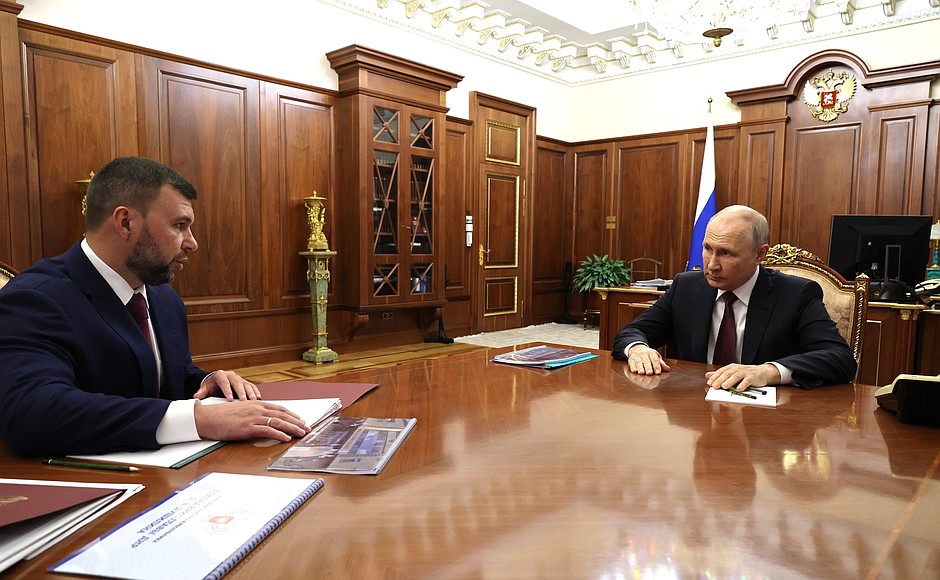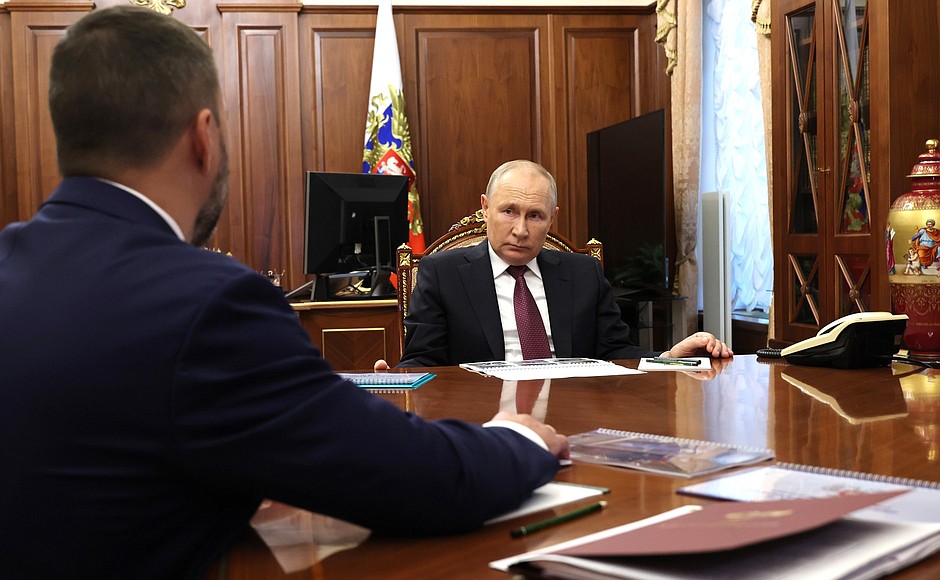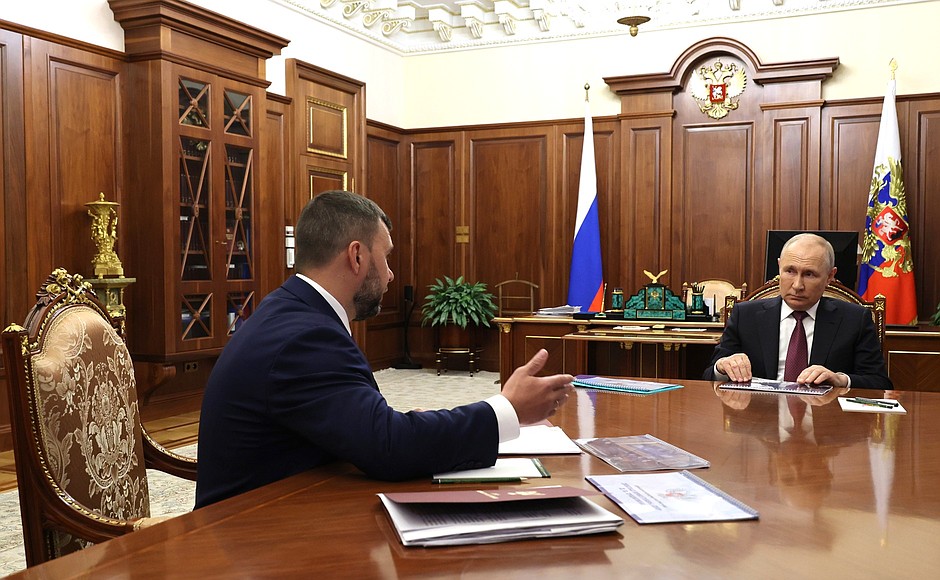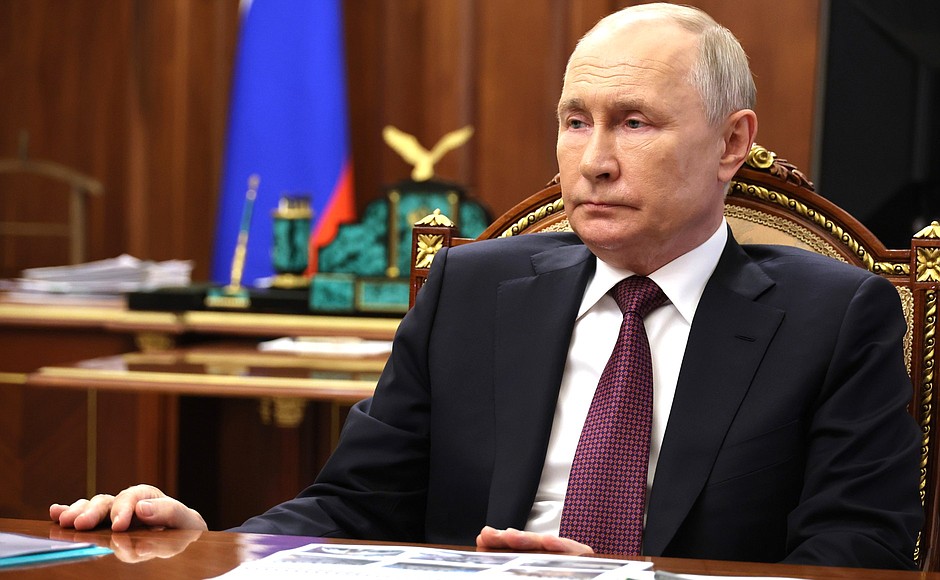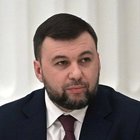President of Russia Vladimir Putin: Mr Pushilin, good afternoon.
Acting Head of the Donetsk People’s Republic Denis Pushilin: Good afternoon, Mr President.
Vladimir Putin: How are things, Mr Pushilin?
Denis Pushilin: Mr President, everything is under control. Things are complicated, difficult, and tense, but under control.
I would like to report on the situation. The first thing that is of most concern to us, the pulse that we need to keep our finger on, is, of course, the situation with shelling. Unfortunately, over the past three summer months, it has worsened for civilians, because the enemy is now using cluster munitions.
Vladimir Putin: Against civilian targets as well.
Denis Pushilin: It is especially dangerous for civilians. Why? Because cluster munitions are quite wide reaching and cause uncontrolled damage, because people are not quite sure how to respond to them. Moreover, not all cluster munitions detonate immediately and just lie around. Just recently, several construction workers were killed on their way to work when one of them found a cluster and brought it to show to his co-workers. It went off just as he was showing it. Three people were killed, three more were wounded. Unfortunately, this is not an isolated incident.
In fact, civilian facilities were the ones that suffered in the recent shelling incidents, including an ambulance station and a blood transfusion centre. All this causes a lot of pain, of course, primarily affecting civilians. In these cases, those who decided to supply cluster munitions in defiance of common sense and contradicting their own statements, these people become accomplices. You have heard the Americans opposing the use of cluster munitions, but now they say that it is all right with them. Overall, to give you the numbers, the number of shelling incidents increased by 23 percent during the summer months compared to the preceding three-month period, with cluster munitions used in 10 percent of these strikes. This is what I wanted to say about civilians.
Still, the men on the frontlines remain in high spirits and are ready to carry on fighting. They all understand very well and can see what is going on. They understand their mission, which consists of pushing the adversary as far back as possible. This is the only way to stop shells from reaching our cities and districts.
Most of the hotspots have been concentrated around the South Donetsk front along the Urozhainoye-Staromayorskoye line. The enemy attacks are unrelenting here with the enemy trying to gain a foothold in these areas, but our men have been doing everything they can to prevent this, and even more. Joint units have been effective in working together. Along the flanks, the Artyomovsk front is another hotspot. But I can say, if cautiously, that the situation is becoming more stable there too.
Since I mentioned Artyomovsk, I learned the distressing news about Yevgeny Prigozhin’s death yesterday as I was heading here. This is a sensitive topic for us, since there were also his men from Wagner Group who lost their lives. They were the ones who took part in liberating Artyomovsk… Of course, this situation caused a lot of anxiety and compassion among us. Unfortunately, we do understand what is going on right now and what kind of an enemy we are dealing with. We also understand that the adversary is ready to pull all the stops.
Vladimir Putin: Regarding the plane crash, first, I would like to express my sincere condolences to the families of all the victims. It is always a tragedy when it happens. Indeed, if Wagner members were on board, since this is what we know judging by preliminary reports, I must say that these people made a meaningful contribution to our common cause to fight the neo-Nazi regime in Ukraine. We remember this, we know this, and will never forget.
I knew Prigozhin for a long time, since the early 1990s. He was a man of a difficult fate and made some serious mistakes in his life, but he also achieved the necessary results for himself and also for the greater good when I asked him, as it happened over the past months.
He was a talented man, a gifted business leader who worked in and outside our country, including in Africa, and was quite effective at that. He worked with oil, gas, precious metals and gemstones there. As far as I know, only yesterday he returned from Africa and had meetings with several officials.
What I can tell you for sure, as the head of the Investigative Committee reported to me this morning, a preliminary investigation into this incident has been launched. It will run its full course. There must be no doubt about that. Let us wait a little and see what the investigators tell us.
A technical expertise and genetic tests are currently underway. This will take some time.
Denis Pushilin: I have no doubt that specialists will get to the bottom of this case. This is something that matters for all of us.
Mr President, I would like to briefly report on your previous instructions and requests.
Water supply. We know how challenging the shortage of water has been, caused by the Kiev regime’s water blockade in the Donetsk People’s Republic. The first leg of a new water pipeline is finished. Now it has become possible to increase the number of hours when water is supplied. Water is still provided according to a schedule but progress has been made.
It would not be true to say that the problem has been resolved everywhere in the republic. However, in some areas, we have been able to change the water supply schedule. Where it used to be provided once every three days, it is now provided once every two days. We are trying to make sure that water is available daily, even if for limited hours. Due to the fact that some segments of the water supply network are almost 90 percent worn down, there are areas where we have not been able to make progress.
Utilities services and relevant ministries continue to work hard to turn the situation around and to prevent the loss of water, which sometimes reaches 60 percent. Losing 60 percent of supplies when there is a critical shortage is, of course, unacceptable.
We are starting to prepare for the heating season and there are many contingent issues. We believe that subsequently, when the second leg of the water pipeline is finished, we will be able to bridge the deficit, until the territories of the Donetsk People’s Republic and the Seversky Donets Canal are fully liberated. Then we will be able to close this matter.
Now, the sensitive issue we have discussed many times: queues at checkpoints. I can tell you that we can see a big difference thanks to the recent measures such as increasing the number of checkpoint facilities, and building new and repairing existing roads. There are occasional bottlenecks but competent services deal with the problem very quickly.
The recent situation with the Crimean Bridge, when vehicles had to take a detour via the land-based corridor, was a certain test for us. We managed to relieve the traffic congestion in less than 24 hours. Ministries, law enforcement and security agencies demonstrated their high professionalism. The National Guard acted impeccably. We work with volunteers from youth organisations and they immediately came to our assistance. The congestion was quickly relieved also thanks to creating park-and-ride facilities. We were ready for that challenge.
(Denis Pushilin also spoke about the operation of the migration service that managed to shorten the waiting time of passport applicants, as well as opening multi-purpose public services centres and recalculating retirement benefits upwards.)
Vladimir Putin: September 1 is near.
Denis Pushilin: Yes, September 1 is an extremely important issue for us. I showed you the presentation. Many schools have been repaired by the patron regions, or the Ministry of Construction. I showed you the way it used to be and what schools look now as we get closer to September 1.
We have never seen such good schools in many respects. Even if we leave out the school in Nevsky, which is open now and is fantastic, everyone who goes there says this.
Vladimir Putin: Is the St Petersburg Deputy Governor working on that?
Denis Pushilin: These are military builders, the ones that built the Nevsky district. In general, the contractors working with the Ministry of Construction and VSK are setting records everywhere, in terms of quality as well. Everything they do is done the way they would do it for themselves: there is everything for everyone. We are now beginning to realise what Russian standards are like. And our teachers look at this and realise what it means to take care of people first, both teachers and students. This commands a lot of respect.
Of course, it is painful for us that schools have remote learning. We have had remote learning for a very long time: the pandemic year, and then the special military operation. There are a lot of requests from parents, because the children are not getting what they need, their studies are not the same. They should be full-time.
By September 1, we plan to almost double the number of schools that will work full-time bringing it to 72 percent. At the same time, parents will have the opportunity to choose what they want, for example, if they are worried, because now, unfortunately, shells can come from anywhere. Safety must come first here. Parents make their own decisions. We provide security to the best of our ability.
Of course, schools in the most frequently shelled areas will continue to operate remotely. This includes schools in Gorlovka, some areas of Donetsk, Makeyevka and Yasinovataya: of course, there will be remote learning. Where there is a rear, where there is an opportunity to ensure security to some extent, there will be full-time learning. For us, it is very important.
We will have 130–147 schools repaired by the end of the year, as well as 122 preschools and five colleges. It is a very high level for us.
As far as healthcare is concerned, I want to thank you. Parents are still grateful that the medical check-ups of children was carried out: many diseases were detected in the early stages, which made it possible for doctors to step in very quickly.
Vladimir Putin: Now, after the medical check-ups, it is very important to outline a work plan for children in need of additional medical care.
Denis Pushilin: Yes, this work is underway. But now the most important thing is that adults are also beginning to undergo medical check-ups.
Vladimir Putin: Yes, I know.
Denis Pushilin: Thank you very much for this decision.
The biggest problem in healthcare is, of course, the lack of human resources. We have personnel shortages of over 50 percent. Since the launch of the special military operation, about 1,700 healthcare workers [from Russian regions] have worked in the republic as volunteers, providing continuous professional medical aid to residents of the Donetsk People’s Republic on a rotation basis. These efforts deserve great respect and we are very grateful. Our patron regions are deeply involved in our problems and try to offer professional support in some cases. I feel nothing but gratitude.
Vladimir Putin: They help with equipment, material supplies and personnel training, of course. The republic should join the national training and professional development programme for healthcare workers.
Denis Pushilin: We never saw this amount of equipment supplies and material support in the past. We have received an incredible amount of equipment, devices and other supplies that make a great difference. We did not have so many MRI and x-ray machines before. And they are all modern. Our medics are very grateful.
Now all we need to do is to create proper training conditions. We have a very good medical university that was among the first to obtain accreditation. Now it is important to retain young professionals in the region.
Vladimir Putin: Are you preparing for the elections?
Denis Pushilin: Of course, Mr President. Just yesterday, we approved our election programme, developed a strategy and outlined our plans. Local parties are quite active. I believe we are ready. Certainly, we are concerned about security. But we have built a system with local security forces. We have a situation centre for regular meetings. I think the general approach is very smart. There are no problems with the Central Election Commission either. We make sure to comply with all the recommendations and requirements according to Russian law. It is another test for us. With your blessing, we are ready to do our best for the people.
Vladimir Putin: Sounds good.
<…>
